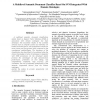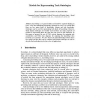122
click to vote
OTM
2010
Springer
15 years 2 hour ago
2010
Springer
The important role given to domain ontologies for knowledge representation implies increasing need for development and maintenance of them. However, we have a scarcity of tools sup...
119
click to vote
KES
2008
Springer
15 years 2 months ago
2008
Springer
One of the main problems facing the development of ontology-aware authoring systems (OAS) is to link well-designed domain-independent knowledge (ontologies) with domain content. Su...
119
click to vote
JCIT
2008
15 years 2 months ago
2008
A multilevel semantic document classification system based on Support Vector Machine (SVM) in association with domain ontologies has been developed. The documents related to the s...
116
click to vote
AICOM
2008
15 years 2 months ago
2008
We propose a novel hybrid recommendation model in which user preferences and item features are described in terms of semantic concepts defined in domain ontologies. The exploitati...
103
click to vote
DLOG
1996
15 years 3 months ago
1996
To ensure the re-use of domain ontologies the usual approach relies on a pivot language, e.g., Kif, intoandfromwhich the domainontologyis translated. This requires several distinc...
131
click to vote
OAS
2003
15 years 3 months ago
2003
The growing interest in ontologies is concomitant with the increasing use of agent systems in user environment. Ontologies have established themselves as schemas for encoding know...
159
click to vote
IJCAI
2001
15 years 3 months ago
2001
Here is discussed how to construct domain ontologies with both taxonomic and non-taxonomic conceptual relationships, exploiting a machinereadable dictionary (MRD) and domain-speci...
121
click to vote
BXML
2004
2004
Experiences Using Semantic Web Technologies to Realize an Information Retrieval System for Pathology
15 years 3 months ago
: Building the Semantic Web requires the use of powerful tools to create, manage and extend domain ontologies represented with Semantic Web languages. Though many tools have been a...
125
click to vote
WONTO
2008
15 years 3 months ago
2008
Knowledge is of general utility and should be captured thinking in reuse. A key idea underlining knowledge capturing for reuse is to consider that there are two major kinds of know...
134
click to vote
LREC
2008
15 years 3 months ago
2008
Acquiring knowledge from the Web to build domain ontologies has become a common practice in the Ontological Engineering field. The vast amount of freely available information allo...


